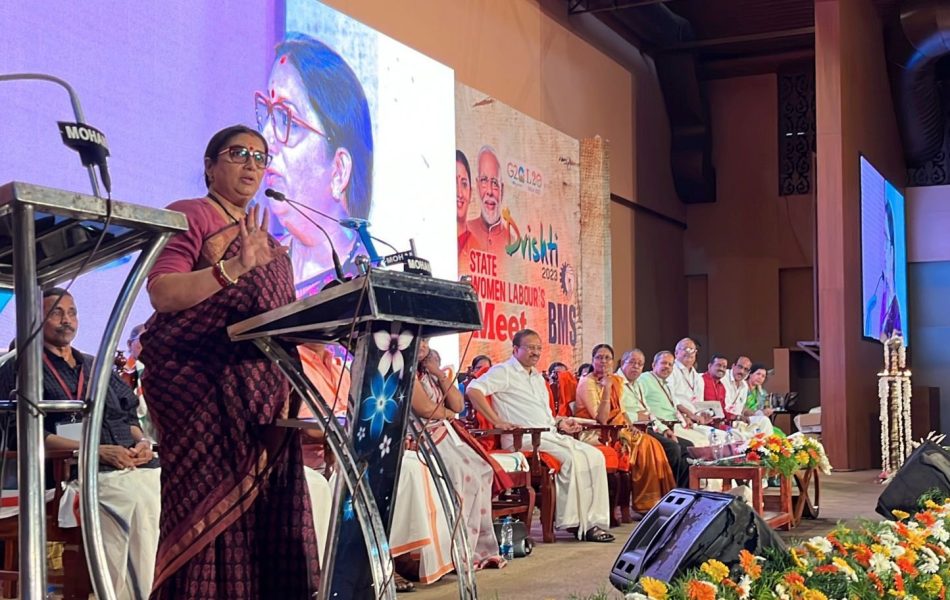
Smriti Irani’s barb at Rahul Gandhi: If he remains in Wayanad, it will turn into Amethi

Union Minister Smriti Irani on Monday (May 22) took a dig at Rahul Gandhi, saying if the congress leader remained as the MP of Wayanad, the constituency would suffer the same fate as Amethi in Uttar Pradesh.
Gandhi was the MP from Amethi before he lost it to Irani in the 2019 Lok Sabha election. He had also contested from Kerala’s Wayanad, which he won, but he was disqualified as an MP in March following his conviction and two-year jail sentence by a Gujarat court in a criminal defamation case.
Irani was in Thiruvananthapuram to inaugurate the state-level Women Labour Convention organised by the Bharatiya Mazdoor Sangh (BMS) Kerala. After the inauguration, the Union minister said she had the “good fortune” of being the one to “send away” Gandhi from Amethi.
On Amethi and Wayanad
“While he was an MP from Amethi, 80 per cent of the people there did not have electricity connections. There was no district collector’s office, no fire station, no medical college, no Kendriya Vidyalaya or Sainik School, and the district hospital had no dialysis centre or X-ray machine,” she claimed.
Also read: 40 per cent commission in Karnataka? It is 80 per cent in Kerala: Congress
“Once he left, all these facilities and infrastructure were made possible there. Therefore, if he remains in Wayanad, it too shall suffer the same fate as Amethi. So, you (people) must ensure he does not remain here,” the Union Minister for Women and Child Development said.
She added that wherever she is, Delhi or Amethi, she worries a lot about Wayanad. Therefore, she decided to convert 250 anganwadis there into saksham (capable) anganwadis.
A saksham anganwadi is a centrally sponsored scheme under which anganwadis in states and Union Territories provide a package of six services — supplementary nutrition, pre-school non-formal education, nutrition and health education, immunisation, health check-up and referral services — to all eligible beneficiaries.
Irani also spoke about the various central government schemes, initiatives or policies implemented in Kerala for women’s safety, financial security of the people, and social welfare of the citizens of the state.
On women’s safety
On the issue of alleged lack of women’s safety in the state, the minister referred to the recent killing of a young doctor — Vandana Das — in a taluk hospital in the state and said it was surprising that such an incident occurred despite the presence of police officers there.
Also read: Kerala govt approves ordinance safeguarding health service workers
She questioned why, despite various central government initiatives, such as training personnel to help victims of cybercrime, distributing forensic kits and facilitating setting up of more fast track courts, and the financial support being provided to strengthen the law and order system in Kerala, there was a “lack of intention” on the part of the administration to ensure women’s safety.
“So, when one hears of crimes against women in the state, one is forced to ask why, despite all this central help, including financial support, to strengthen the systems, there is a lack of intention on the part of the state government to ensure women’s safety,” the minister said.
On Left govt
Union Minister of State for External Affairs V Muraleedharan, who also spoke at the event, expressed a similar view on the issue of women’s safety, especially in their workplaces.
He said that having night walks, where women in large numbers take to the streets, does not indicate or ensure their safety, as, in reality, they often have to return home late from work all alone.
Also read: Kerala govt releases ‘The Real Kerala Story’ ad to mark its second anniversary
Irani, in her speech, also contended that while the ruling Left Front in the state makes claims of working for the welfare of the poor, it was the Centre which was trying to ensure economic justice and financial security to the people of Kerala. “The Left only makes claims,” she alleged.
She further alleged that the Left Front was only known for strikes and worked for their own political development.
(With agency inputs)

